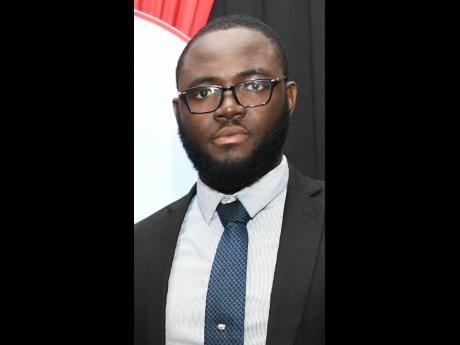‘Troubling scapegoating’
Caution urged in ban on creative expression
Attorney-at-law Matthew Royal believes that the Broadcasting Commission’s move to impose an immediate ban on the playing of music glorifying lottery fraud, the use of illegal substances and illegal firearms raises a number of potential...
Attorney-at-law Matthew Royal believes that the Broadcasting Commission's move to impose an immediate ban on the playing of music glorifying lottery fraud, the use of illegal substances and illegal firearms raises a number of potential constitutional issues.
The ban, which was issued on Tuesday, prevents the transmission of any audio or video recorded material, live song, or speech, which promotes and glorifies the use of offensive weapons, vigilante justice or any other form of illegal or criminal activity.
According to Royal, the regulator's mandate of controlling the content of what is broadcast on the nation's public airways must be properly balanced with the right of broadcasters to publish content with their guaranteed right to freedom of expression.
This balancing act must determine a form of regulation that does not infringe upon the rights of broadcasters and those who use such media, he said.
The attorney told The Gleaner that one of the constitutional issues comes down to the wording and phrasing of the directive.
It forbids the use of urban slang terms like “chop di line” and numerous variations – all of which have different spellings – in song lyrics because they reportedly encourage illegal activity.
FORBIDDEN TERMS
The terms “burner phone”, “client”, “bang line”, “chop”, “choppins”, “choppa”, and “choppa phone” are also forbidden.
Additionally, the use of words or slang that have nothing to do with scamming, but are nevertheless problematic when used in conjunction with other words – like “leads, lead list/sheet,” “bank/foreign account”, “food”, “wallet”, or “purse”, or when they are connected to moneymaking, wire transfers, accumulating wealth, or leading an opulent lifestyle – are also prohibited.
“I think a key issue would be what amounts are the promoters glorifying scamming. How do we know whether that something that refers to scamming or refers to one of those prohibited kinds of conduct is promoting or glorifying it as opposed to just art reflecting the realities of daily life?” Royal questioned.
“For example, if I build a song about being able to go to school because my father is a scammer, am I promoting or glorifying scamming or am I merely reflecting in art my daily realities?” he further asked, noting possible challenges arising from the directive.
The Broadcasting Commission pointed to Regulations 30(a) and 30(j) of the Television and Sound Broadcasting Regulations, which prohibit the broadcast of material which contravene the law or is likely to incite violence or lead to criminal activity. A breach of the regulations could see a person being fined up to $10,000 in court or sentenced to up to 12 months in prison.
Royal did, however, point out that broadcasters could contest any penalties imposed for the violation.
He asserted that one could argue an anticipatory violation of their fundamental rights or that the rule itself has a chilling impact on the freedom of expression principle even before a sanction has been applied.
“So, a broadcast house can challenge this even before any regulation is officially promulgated,” he said.
The Broadcasting Commission declared in a statement that the directive taken reinforced its commitment to keeping the airwaves free of harmful content with consideration of the significant role that traditional media still plays as socialisation agents.
Popular radio host and disc jockey (DJ) Wesley 'Burgerman' Burger expressed his dissatisfaction with the banning of edited versions of contentious material. This includes prohibition of near-sounding terms in place of inappropriate lyrics, expletives, or profanities, as well as the live editing and original edits of the song.
“A lot of times there are a lot of songs right now or in the past that you play on radio that are edited that the general public don't even know what the song is really all about until somebody explain to them the original or the unedited version,” Burger told The Gleaner.
He added that if a song was well edited and was not perpetuating violence and glorifying any of the other activities the censorship seeks to curtail, then it should pose no problem.
“Whilst I support the morality in the society, I don't necessarily support the Broadcasting Commission to that extremity. I think they could give some amount of leverage to the edited version,” he said, adding that the edited version of the lyrics, in some instances, takes away from the glorification which was intended.
Burger questioned whether the ban would have any effect on especially the youth, who would turn to other channels to consume such material.
“Them still have them underground sources,” he said, adding that many songs were not first heard or popularised through traditional media but that teenagers were listening to the unedited versions from other sources.
Stressing that he was not against attempts to restore a sense of morality and standards to the airwaves, Burger said that since it was a DJ's job to stay up to date with the music industry and to please listeners, the Broadcasting Commission was placing an undue amount of pressure on them and driving away young people from radio.
Professor emerita and Gleaner columnist Carolyn Cooper told said that any attempt to curb illicit activities in Jamaica was welcomed.
“It's easy to ban certain types of music. What is much more difficult and essential is comprehensively analysing the social problems at the root of criminality,” Cooper said, noting that a comprehensive analysis of society's larger problems is required.
“It's not just music lyrics that glorify these illegal activities, so scapegoating music as the main form in which these ideas are expressed is, for me, troubling,” she told The Gleaner.
“You need to more broadly examine all of the spaces in which illegal activities are done,” she said.

